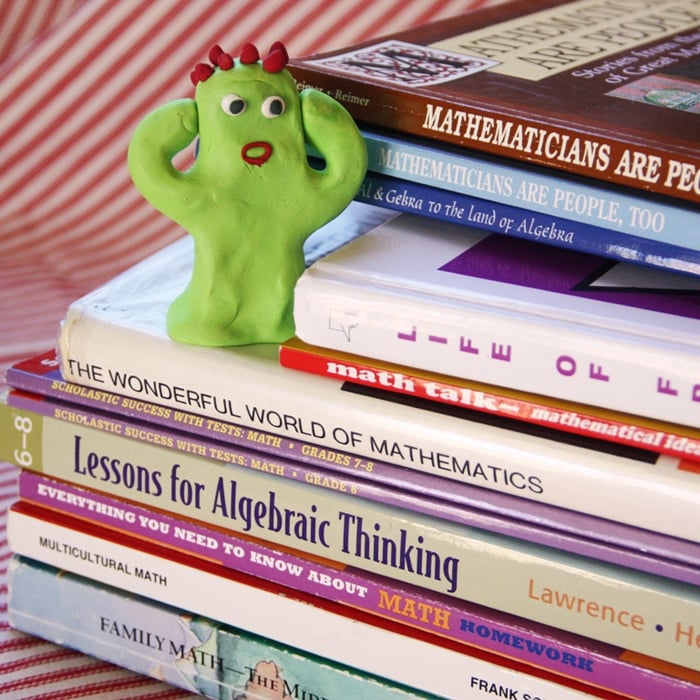You Are Smart Enough!

I remember when Noah was in the 4th grade, his math text had a lesson about fractions: dividing them, multiplying them, adding and subtracting them. I looked at the page and panicked. I couldn’t remember a single thing about fractions—except they had confused me as a girl, and I resented the United States of America for not going on the sane metric system like they had promised back in 1975!
I stared blankly at the page. Nothing. Not a thing. I had no idea how to find a common denominator, or when to flip the fraction, or how to reduce the overgrown result once you got past the equals sign.
I was 35 years old.
My father’s voice rang in my head: “The only true intelligence is mathematical intelligence” shared with me after I had earned straight A’s in English, Social Studies, Spanish, Science, and Acting.
He didn’t mean any harm. I think he really believes that to this day, though he always approves of my work and was proud of my good grades.
Still, I managed to bungle math so many times, my Algebra 2 instructor suggested I quit at the semester. He bargained, “I’ll give you a B if you drop the class. It’s torturing you and I don’t want you to harm your GPA for college.”
Needless to say: my confidence in teaching math to my kids was low.
I used Cuisinaire Rods in the early years to help them understand multiplication, only to realize with astonishment: “Did everyone know that four groups of four makes sixteen? How had I never learned that?!”
Oh I knew my times tables. I just didn’t understand them.
I had not comprehended multiplication—the basis of it. To me, it was a set of memorized magic—tables of numbers associated with each other for inscrutable reasons. I never quite grasped the fundamentals: multiplication meant multiples of the same thing. Mind Blown!
How had I missed that? With the endless tutoring, teacher help, textbook study, math labs, and a father with an engineering degree, how had I missed the primary structure of multiplication? Why had no one made sure I had got that much? Perhaps because it was so obvious to everyone else, it didn’t seem possible that it was not obvious to me?
I don’t know. But what I do know is the day I had an epiphany about the times tables is the day I began my true math education. In my thirties. With four children and a baby on the way.
So when faced with fractions, I took the book, excused myself to the garage, and sat on the concrete floor playing with the rods and making myself understand fractions. It took me a bit of time, but not that long. After all, I had been baking, cooking, and quilting for a decade and a half. I had familiarity with fractions even if I didn’t understand how to use them in mathematical equations.
Understanding returned; or rather, grew! I saw what had eluded me in my grade school days.
I re-entered the house armed with the information, and now, understanding, that would enable me to teach Noah. He learned it all easily. Then he said, “So basically what you are saying is that I need to learn fractions now because we use them in school, but adults never need to use them, right? Because you didn’t understand them until a few minutes ago…”
Ha! Caught me. Made me laugh. I explained my profound lack of skill in math and how it had hampered me from many possible career options, and had made some of the work I do difficult as a result. But I resolved now that we learn together.
I never did become a fabulous math teacher to my children. Yet they have all surpassed my impoverished skills. I made sure they had tutors or went to classes at the local public school for higher math. Each of them has shown an aptitude far ahead of mine. But then again, they each had individualized help to catch those oversights before they mushroomed. They didn’t live under the wrong impression that true intelligence was only found in mathematics.
There is no subject area you can’t learn along with your children. I had a friend who was bilingual in Spanish and English, but without a good working knowledge of written Spanish or English. She hired a tutor…for herself! And learned. Then taught her kids.
It can be done. You are now an adult, with far more experience, patience, and mental agility than when you were 10, 12, and 16. What you missed before can be learned now. At the very least, you can ensure that your children have the chance to understand what was inscrutable to you. Take the time to find the tools that bring you understanding, not just information or practice sheets.
Then share them with your children and continue to advance your own understanding. You are smart enough. You are committed enough. You love your children enough. There are tools and helps enough.
Enjoy your educational renaissance!
Image by jimmiehomeschoolmom (cc)

















